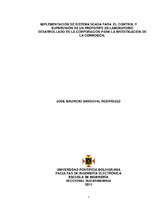Implementación de sistema SCADA para el control y supervisión de un prototipo de laboratorio desarrollado en la corporación para la investigación de la corrosión
Fecha
2014-09-09Director/Asesor
Villamizar Rincón, Juan Carlos
Tipo de contenido
bacherlorThesis
Citación
Metadatos
Mostrar el registro completo del ítemDocumentos PDF
Resumen
Los sistemas de ejecución manual de la dosificación de líquidos inhibidores en las industrias del petróleo han conllevado a una serie de errores de medición, dificultad para realizar ajustes de variables, retardo en los tiempos de entrega, pérdida considerable de producto y en el peor de los casos a la pérdida de control del sistema que se encuentre manejando. El éxito de este tratamiento químico para evitar la corrosión no sólo está asociado a la eficiencia del producto sino también, en asegurar la aplicación de la dosis recomendada. En este sentido, se han detectado fallas en la continuidad de la inyección por razones de confiabilidad del funcionamiento de las bombas (problemas eléctricos y de baterías, aireación de la bomba, etc.) dificultades en las visitas a los pozos para realizar el ajuste de la rata de inyección y la verificación del nivel o disponibilidad del producto en sitio. Bajo este panorama, el impacto de esta problemática se precisa en términos del cumplimiento de la disponibilidad del inhibidor de corrosión en los puntos críticos de control afectando la efectividad del tratamiento y en consecuencia, reduciendo la protección de la infraestructura. El diseño del prototipo propuesto le permitirá a la Corporación para la Investigación de la Corrosión y a la Universidad Pontificia Bolivariana, trabajar, implementar y conocer más a fondo todo lo relacionado con los sistema SCADA, como por ejemplo, el manejo de las variables a distancia, los posibles errores y dificultades que se presenten en el campo, problemas con los sensores en ambientes externos, entre otros. Y por consiguiente llevar a mejorar el desempeño de los procesos. The systems of manual execution of liquid dosing in the oil industries had carried to a series of measurement mistakes, difficulty to realize variables adjustments, delay in delivery dates, considerable loss of product and in the worst case the loss of the system that they are handling.
The success of this chemistry treatment to avoid the rust is not only associated to the efficiency of the product but also in assuring the application of the recommended dose. In this way, problems have been detected in the continuity of the injection for reasons of reliability of the functioning of the bombs (electrical problems and of batteries, aeration of the bomb, etc.) difficulties in the visits to the wells to realize the adjustment of the injection rate and in checking the level or product availability in site.
Under this panorama, the impact of this problematic is needed in terms of the fulfillment of the availability of the inhibitor of corrosion in the critical points of control affecting the efficiency of the treatment and in consequence, reducing the protection of the infrastructure.
The design of the proposed prototype will allow the Corporation for the Investigation of the Corrosion and the Pontificia Bolivariana University, to work, to help and to know more thoroughly everything related to the SCADA system, for example, the management of the distantly variables, the possible mistakes and difficulties that could be present in the field, problems with the sensors in external environments, among others and consequently to lead to improving the performance of the processes.
Palabra/s clave
Ingeniería electrónica
SCADA
Reguladores secuenciales programables
Instrumentos electrónicos digitales
Corrosión electrolítica
Tesis y disertaciones académicas
Colecciones
- Trabajos de grado [6439]


